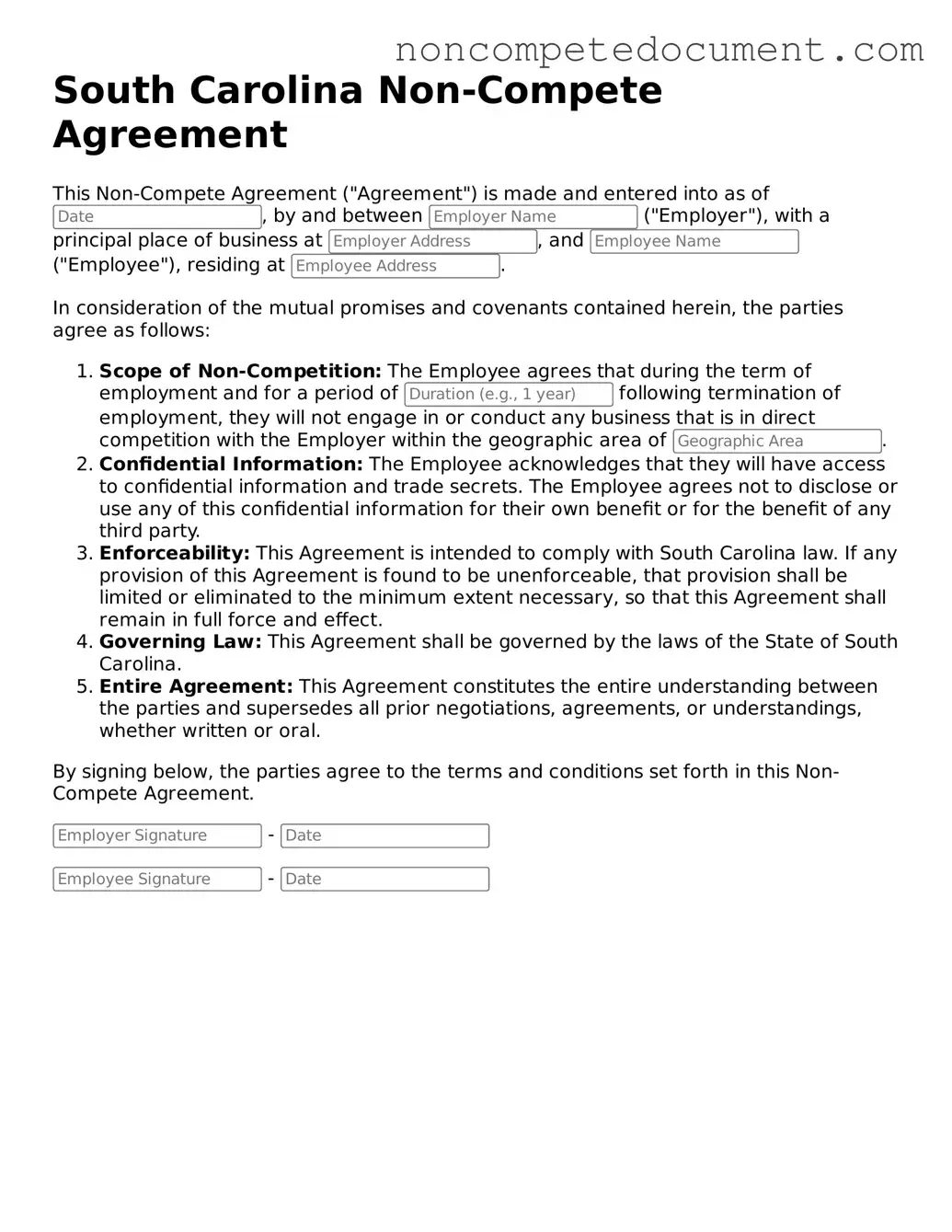Fillable South Carolina Non-compete Agreement Template
In the competitive landscape of employment, the South Carolina Non-compete Agreement form serves as a crucial tool for both employers and employees. This legal document outlines the terms under which an employee agrees not to engage in certain business activities that could directly compete with their employer after leaving the company. It typically includes essential components such as the duration of the non-compete period, the geographical scope in which the restrictions apply, and the specific activities that are prohibited. Understanding the nuances of this form is vital, as it not only protects the employer's business interests but also ensures that employees are aware of their rights and obligations. The enforceability of such agreements can vary based on specific circumstances, making it important for all parties to approach the document with careful consideration. In South Carolina, courts generally look for reasonableness in terms of time, geography, and the nature of the restricted activities, highlighting the need for clarity and fairness in the agreement's terms.
Common mistakes
When filling out the South Carolina Non-compete Agreement form, individuals often make mistakes that can have serious implications. One common error is failing to clearly define the scope of the non-compete. This includes specifying the geographic area and the duration of the restriction. Without these details, the agreement may be deemed unenforceable.
Another frequent mistake is not considering the reasonableness of the terms. The agreement must protect legitimate business interests without being overly restrictive. If the terms are too broad, a court may refuse to enforce the agreement. It's essential to strike a balance that protects the employer while still allowing the employee to seek future employment.
Additionally, many people neglect to include consideration in the agreement. Consideration refers to what the employee receives in exchange for agreeing to the non-compete. This could be a job offer, a promotion, or other benefits. Without adequate consideration, the agreement may lack legal standing.
Some individuals also overlook the importance of reviewing the agreement with legal counsel. A legal professional can provide insights into the enforceability of the terms and help identify any potential issues. Skipping this step can lead to misunderstandings and complications down the line.
Another mistake is not keeping the agreement updated. As business needs change, so too should the terms of the non-compete. Failing to revise the agreement to reflect current circumstances can render it ineffective. Regular reviews can ensure that the agreement remains relevant and enforceable.
Finally, individuals often forget to communicate openly about the non-compete with their employees or contractors. Transparency is key to maintaining trust and clarity. Discussing the terms and their implications can prevent confusion and foster a better working relationship.
Dos and Don'ts
When filling out the South Carolina Non-compete Agreement form, it is important to follow certain guidelines to ensure that the document is completed correctly. Here are some dos and don'ts to consider:
- Do read the entire agreement carefully before filling it out.
- Do ensure that all parties involved understand the terms and conditions.
- Do provide accurate and complete information in all sections of the form.
- Do consult with a legal professional if you have any questions or concerns.
- Don't rush through the form; take your time to avoid mistakes.
- Don't leave any sections blank unless specifically instructed to do so.
More Non-compete Agreement State Forms
How to Get Around a Non Compete - This form establishes clear boundaries for employees seeking new opportunities after leaving a company.
Ohio Non Compete Law - Some jurisdictions have placed limitations on the enforceability of non-compete agreements.
Atlanta Non-compete Lawyer - A standard practice is to inform employees of the non-compete policy before hire.
How to Get Out of a Non Compete Agreement - A well-drafted Non-compete Agreement will be reasonable in scope, duration, and geography to be enforceable.
Misconceptions
Many people have misunderstandings about the South Carolina Non-compete Agreement form. Here are five common misconceptions, along with explanations to clarify them.
-
Non-compete agreements are always enforceable.
This is not true. In South Carolina, non-compete agreements must meet specific criteria to be enforceable. They need to be reasonable in time, geographic area, and scope of activity.
-
All employees must sign a non-compete agreement.
Not every employee is required to sign a non-compete agreement. Employers typically ask for these agreements from key employees or those with access to sensitive information.
-
Non-compete agreements can last indefinitely.
In South Carolina, the duration of a non-compete agreement must be reasonable. Courts may not enforce agreements that last too long or are overly restrictive.
-
Once signed, a non-compete agreement cannot be changed.
Non-compete agreements can be modified if both parties agree to the changes. It is important to document any modifications in writing.
-
Non-compete agreements apply to all job types.
This is a misconception. Non-compete agreements are more common in certain industries, such as technology or sales, where confidential information is crucial. They may not be relevant for all job types.
Key takeaways
When filling out and using the South Carolina Non-compete Agreement form, consider the following key takeaways:
- Understand the Purpose: A non-compete agreement restricts an employee from working for competitors after leaving a job. This protects the employer’s business interests.
- Identify Key Parties: Clearly state the names of both the employer and the employee. This ensures that both parties are legally bound by the agreement.
- Define Scope: Specify the geographic area and duration of the non-compete. This helps to make the agreement enforceable and fair.
- Consider Reasonableness: The terms should be reasonable in scope and duration. Courts may not enforce overly restrictive agreements.
- Consult Legal Counsel: Before finalizing the agreement, seek legal advice. An attorney can ensure the document meets South Carolina laws and protects your interests.
- Keep Copies: Both parties should retain signed copies of the agreement. This provides proof of the terms agreed upon in case of disputes.
